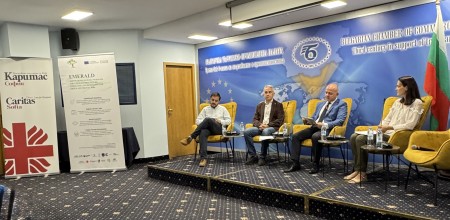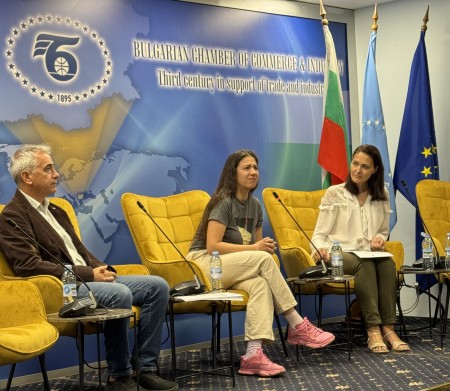Project EMERALD: Best Practices for the Integration, Employment, and Entrepreneurship of Migrants in Bulgaria
The Bulgarian Chamber of Commerce and Industry (BCCI) and Caritas Sofia organized a discussion event titled “Triple Transition: When Green and Digital Innovations Support Social Integration.” The event marked the launch of the EMERALD Project – Empowering Migrant Workers for a Sustainable Future: Upskilling and Reskilling for Green and Digital Jobs, implemented under the Erasmus+ programme.
The main objective of the event was to present the goals and expected results of the EMERALD project, together with successful practices for the integration, employment, and entrepreneurship of migrants in Bulgaria.
Among the speakers were Dr. Vasil Todorov, Vice - President of BCCI, Tsvetomir Dumanov, Executive Director of Caritas Sofia, Nicolas Rodriguez, UNHCR Representative in Bulgaria, Bistra Ivanova, Multi Kulti Collective, Atanaska Todorova, Confederation of Independent Trade Unions in Bulgaria (CITUB) and Sevdalina Voynova, Sofia Development Association.
“The green and digital transition opens up new opportunities for individuals and for economies across the EU by creating new jobs in various sectors,” said Dr. Vasil Todorov during the opening of the event. He emphasized that in the short term, the labor market is expected to face a growing skills gap due to rapidly evolving technologies and the low willingness of older workers to participate in upskilling and reskilling programs. Additionally, Europe continues to face challenges in integrating foreign-born citizens and fails to fully utilize the available knowledge capital.
Vasil Todorov underlined that the EMERALD project is aimed at reskilling the European workforce for the green and digital transition, with a focus on unemployed individuals and migrant workers.
The project will support the creation of public-private cooperation frameworks (“reskilling labs”) for developing training in high-demand sectors through green and digital skills, contributing to a more inclusive “triple transition.”
The event also featured findings from studies conducted by the Bulgarian Chamber of Commerce and Industry on other initiatives related to the twin transition and sustainable migration and integration in Bulgaria.
According to research from the Twining Project, the benefits of the twin transition include: Improved competitiveness (90%), Access to new clients and markets (60%), Increased energy efficiency (50%). Reduced costs (30%).
A separate study on employers’ attitudes towards hiring third-country nationals, conducted under the Functionally Sustainable Migration and Integration in Bulgaria Project, revealed that more than 78% of companies in the country need additional employees, and 64% of Bulgarian employers are open to hiring third-country nationals.
During the event, representatives from NGOs, trade unions, and municipal organizations shared their personal experiences regarding the progress and challenges in integrating third-country nationals and migrants into the Bulgarian labor market.



